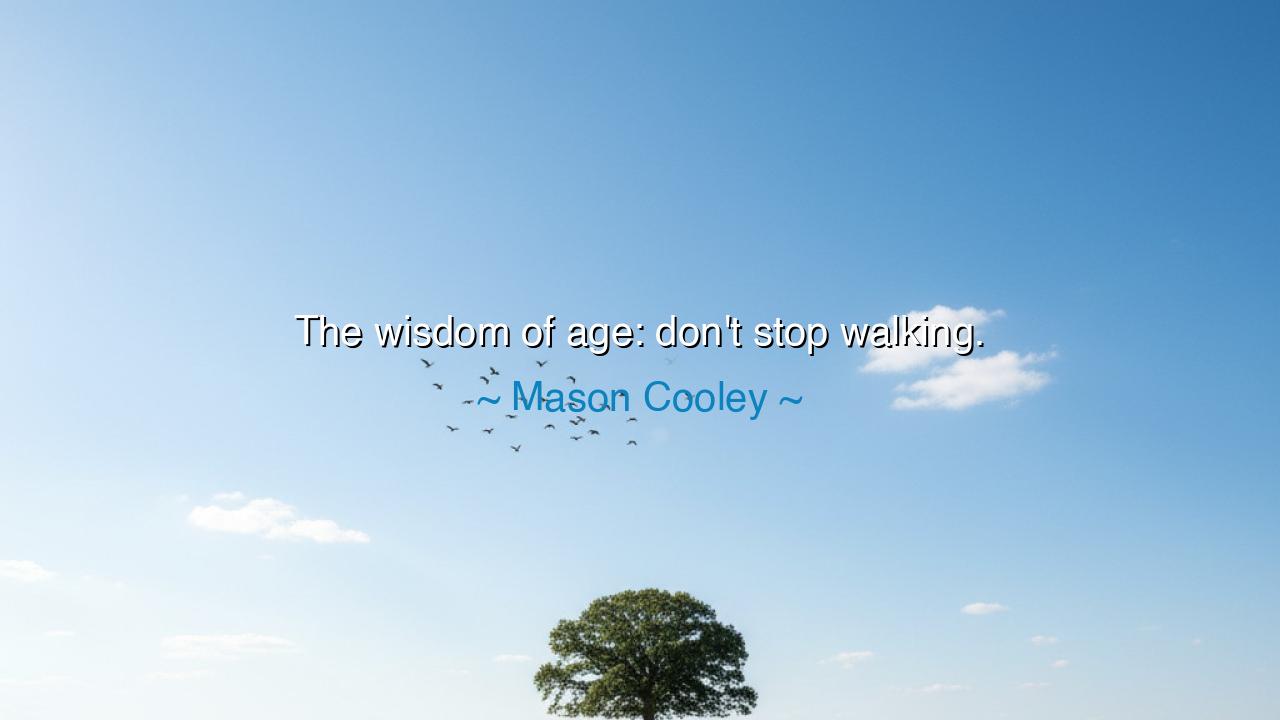
The wisdom of age: don't stop walking.






Mason Cooley, in his brevity, spoke as the sages of old: “The wisdom of age: don’t stop walking.” These words, though simple in form, contain a truth vast as the horizon. For life is a journey, a pilgrimage of spirit and body alike, and the greatest peril is not in stumbling, nor even in falling, but in ceasing to move forward. The true wisdom of age is perseverance—the refusal to surrender the path, no matter how heavy the years or how weary the bones.
To walk is more than the act of placing one foot before the other. It is the symbol of endurance, of courage, of the flame of life that refuses to be extinguished. Youth often runs and tires; age walks and endures. In every step, the aged declare: “Though the body may bend, the spirit does not break.” The road of life demands this rhythm, steady and unwavering, until the final breath.
History offers us countless witnesses to this truth. Consider Nelson Mandela, who spent twenty-seven years in prison, years that would have broken lesser men. Yet he did not stop walking—not in body, for he paced his cell each day, nor in spirit, for he held fast to hope. When at last he emerged into freedom, it was not with bitterness, but with the strength of one who had kept walking through darkness into light. His life became a testimony that the steady march of the spirit outlasts even chains and stone walls.
The ancients knew this well. The pilgrims of every faith pressed on through deserts and mountains, often frail in body yet mighty in soul. Soldiers broken by war still marched, farmers bent by toil still sowed, elders wrinkled with years still carried wisdom to their children. To stop walking is to surrender; to keep walking is to affirm life itself, even in its twilight.
O children yet unborn, remember this counsel: let not despair, nor weariness, nor the shadows of age persuade you to halt upon the road. For the journey is the gift, and the walking itself is victory. The wisdom of age is not to move quickly, nor to move grandly, but simply this—to not stop walking, for every step is a triumph over the silence that waits at the end.






CTChau Tran
Reading this makes me think about the intersection of health, mindset, and philosophy. Walking might symbolize both literal movement and the metaphorical journey of life, suggesting that aging gracefully involves maintaining motion in all senses. I’m curious how this principle could inform public health initiatives or personal routines. Does continuing to move, adapt, and engage with life become a defining mark of wisdom, setting apart those who embrace aging fully from those who resist it?
TTTan Tran
This statement encourages reflection on habits that sustain longevity and life satisfaction. I wonder if ‘walking’ could represent a broader principle of persistence, curiosity, and engagement. How can we cultivate this mindset in younger generations to prevent stagnation before age becomes a factor? I feel inspired to consider daily practices that maintain both physical activity and a dynamic approach to learning, relationships, and personal development, embodying the wisdom of age proactively.
MTminh tranduc
Cooley’s words make me question the nature of wisdom itself. Is part of growing older the understanding that continuous effort, whether physical or metaphorical, sustains us? I feel intrigued by the idea that stopping—even briefly—could signify more than rest, potentially signaling complacency or resignation. How can we balance the need for rest with the imperative to keep moving forward in order to nurture both body and mind as we age?
TVTrung Vinh
I find this statement both inspiring and grounding. It seems to suggest that movement, action, or forward momentum is essential to maintaining vitality and perspective. I’m curious whether Cooley is encouraging a literal lifestyle of walking or a broader metaphorical approach to life’s journey. How might this advice influence mental health, relationships, and personal fulfillment? Could the act of ‘walking’ become a symbol for continual engagement with the world, regardless of age?
MDDao My Duyen
This quote prompts me to reflect on aging and the importance of consistent activity. I feel it emphasizes resilience, suggesting that stagnation—whether physical, mental, or emotional—can erode wisdom. I wonder how this principle can be applied to daily routines, lifelong learning, and even social engagement. Is the wisdom of age not just accumulated knowledge, but also the discipline to keep moving, adapting, and embracing life’s challenges actively?